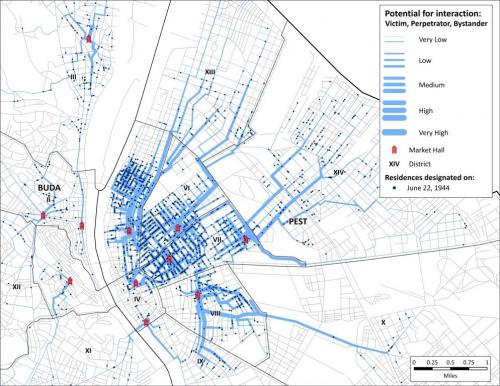Call for Proposals: EHRI Conference: Holocaust Studies in the Digital Age. What’s New?

Holocaust Studies in the Digital Age. What’s New?
Date: Tuesday, 2 July 2019
Location: Stedelijk Museum, Amsterdam, The Netherlands
Deadline for proposals: 9 February 2019. THIS CALL IS NOW CLOSED!
Holocaust Studies is a dynamic multidisciplinary research field that is dedicated to the Holocaust itself but also includes aspects of the post-Holocaust world such as memory, human rights, Jewish life or international relations. At the same time, the research field has a manifest public dimension. In recent years digital practices have had a profound effect on Holocaust Studies. From its start in 2010 the European Holocaust Research infrastructure (EHRI) has not only been stimulating, but also monitoring and studying this development.[1] Against this backdrop the upcoming conference Holocaust Studies in the Digital Age, What’s New?, organized by the NIOD, will explore how digital technology influences contemporary Holocaust research in its broadest sense. Is the research field undergoing a digital transition that profoundly changes its nature? We will take stock of the contemporary effects of the ‘digital turn’ by discussing three interrelated themes:
Digital representations as research tools
Visualisations of the spatial dimensions of the Holocaust are among the most eye-catching digital developments in Holocaust Studies. In this session we question how, or to what extent, these visualisations also function as research tools that assist in the revision of old insights and in the development of new research questions. Session keynote: Digital Representations as Research Tools: The Experience of Geographies of the Holocaust, by Tim Cole (University of Bristol).
Commercial players as game changers
The field of Holocaust Studies currently witnesses the emergence of creative and digital industries that support more traditional (often state-funded) cultural and research institutions in order to extend their societal outreach with new digital communication tools. As a result, audiences become more and more active stakeholders that play a significant role in the study and memorialisation of the Holocaust. In this session we analyse and discuss how these developments affect the field of Holocaust Studies. Session keynote: Re-Imagining the Team: Holocaust Research and Education in a Distributed Age, by Michael Haley Goldman (U.S. Holocaust Memorial Museum).
Remembrance as an obligation
Long-standing questions such as “do we have an obligation to remember the Holocaust?”, “why may such an obligation exist?” and “how can it best be fulfilled?” have recently found fresh and unexpected impulses from the digital turn in Holocaust Studies. In this session we discuss to what extent this digital turn has created new ethical and legal challenges for researchers. Which standards and strategies are developed in this context? Session keynote: Debunking Digital Myths: Holocaust Memory for the Future, by Victoria Walden (University of Sussex).
By connecting these three topics, we aim to be able to explore new directions, challenges and opportunities for Holocaust research in the digital age. To elaborate on these topics, we invite a selection of scholars in the field to present their views. Each accepted proposal will be allotted up to 15 minutes for presentation followed by discussion. The conference will be conducted in English.
This conference will take place on 2 July 2019 at the Stedelijk Museum in Amsterdam, the Netherlands. If you are interested in giving a presentation, please send a short proposal of no more than 500 words and a CV (including all relevant contact information) to: Martijn Eickhoff, m.eickhoff@niod.knaw.nl.
The deadline to submit proposals is 2 February 2019. Notification will be sent via email in March 2019.
Funding for travel and accommodation will be available for presenters in accordance with European Commission guidelines and the EHRI project budget.
Please note that this conference will form one part of a broader event to take place in Amsterdam to mark the conclusion of the current EHRI project (further information will follow soon).
Image: Map of Budapest: Potential for interaction: Victim, Perpetrator, Bystander. Click here for a larger image. © Alberto Giordano and Tim Cole.